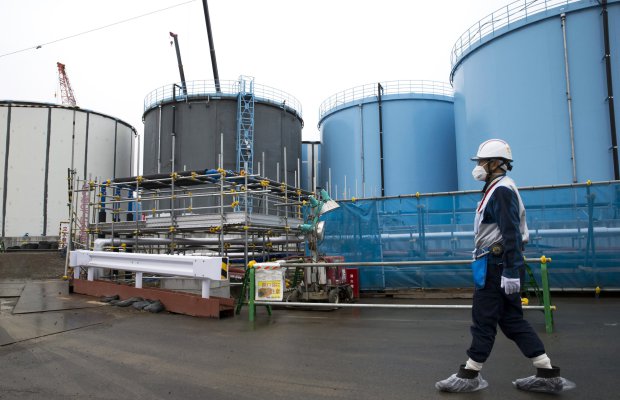Update:Japan Times (linked at bottom) update now reports that the Construction Minister of Japan said TEPCO would ruin the fish industry (um, what about the planet!?) so now TEPCO is backpedaling. Do you think it’s because they care about destroying our planet? Or bad PR?
You can see above as an employee walks past storage tanks for contaminated water at the tsunami-crippled Fukushima Dai-ichi nuclear power plant of the Tokyo Electric Power Co. (TEPCO) in Okuma town, Fukushima prefecture, Japan. Massive amounts of radiation-contaminated water that has been processed and stored in hundreds of tanks at the plant are hindering decommissioning work and pose a safety risk in case another massive quake or tsunami strikes. TEPCO needs to release the water – which contains radioactive tritium that is not removable but considered not harmful in small amounts (RIGHT!) – dumping it straight into the Pacific Ocean, TEPCO’s new Chairman Takashi Kawamura said.
A Japanese company is preparing to dump 777,000 tonnes of radioactive waste into the ocean.
The 2011 Tsunami, which killed 16,000 people, also disabled the emergency generators at Fukushima Nuclear Power Plant.
This meant the cooling systems were not active when the reactors shut down.
According to the Japan Times, this caused the biggest nuclear disaster since Chernobyl.
While the clean-up operation continues to this day, tonnes of water is used to pump through the reactors to stop them overheating.
It means that this water becomes radioactive and needs to be stored away.
Now 600 barrels containing around 777,000 tonnes of radioactive water are set to be dumped in the ocean.
Chairman of the Tokyo Electric Power Company, Takashi Kawamura, claims that it is essential because they are running out of space to store the barrels.
‘The decision has already been made,’ he said.
It’s understood that the water contains a radioactive form of hydrogen called tritium.
This isotope is used in nuclear weapons, self-powered lighting and chemistry.
Fortunately, tritium is only dangerous to humans if it is ingested in large amounts. (Oh boy, we feel safe, not!)
When the waste is released into the ocean, it will be diluted say experts (REALLY!?)
Japan is one of 14 countries who have dumped radioactive waste into the ocean.
The USSR, between 1959 and 1992 discarded the most amount of waste, which was mainly in the Arctic Ocean.
The UK is just behind Japan on the list, with Switzerland and America far behind in third and fourth.
Oceanographer Simon Boxall adds: ‘In the broad scale of things, if they do end up putting the material in the Pacific, it will have minimal effect on an ocean basin scale.
‘In an ideal world, we wouldn’t be in this situation. But the question is, what is the safest way forward? In many ways, this is a pragmatic solution.’















